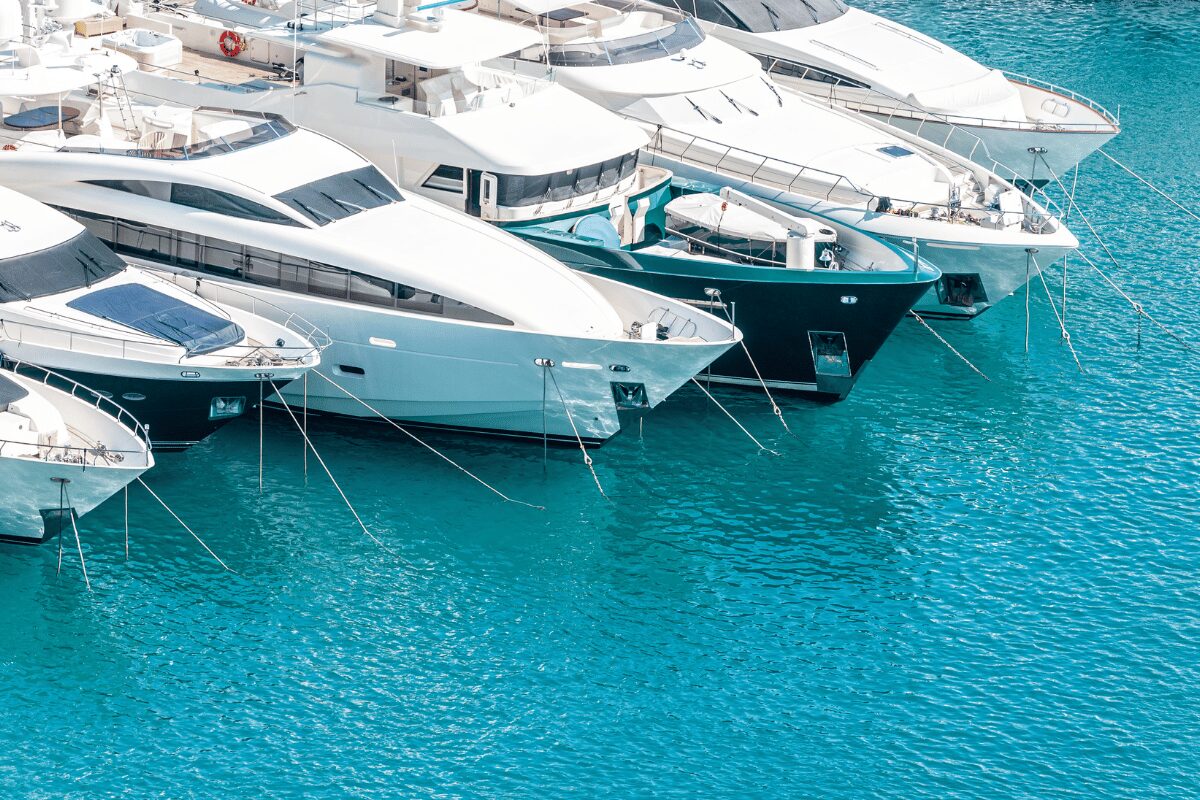Introduction
In today’s digital-first marketplace, yacht businesses that neglect SEO are making costly mistakes that directly impact bookings and revenue. From charter companies struggling to attract international clients, to yacht brokers competing for high-value leads, SEO is no longer optional. It’s a business necessity. Unfortunately, many yacht businesses continue to repeat the same errors: targeting the wrong keywords, ignoring local SEO, failing to optimize their websites technically, and overlooking content that builds trust.
According to Boat International, the global yacht charter market is expected to grow steadily, with digital marketing playing an increasingly critical role in client acquisition Boat International. Yet despite this growth, many yacht websites remain invisible on Google due to fundamental SEO oversights. As Search Engine Journal explains, “SEO mistakes can often be avoided with proper planning and a long-term strategy”.
In this article, we’ll break down the most common SEO mistakes yacht businesses make, and show you how to avoid them. Whether you manage a fleet of luxury yachts or run a boutique charter service, these insights will help you improve your online visibility, attract the right clients, and ultimately book more charters. For tailored guidance, you can also explore our SEO services for yacht companies.
Why SEO Matters for Yacht Companies
For yacht companies, SEO is not just about visibility, it’s about being present at the exact moment a high-net-worth client is searching for their next luxury experience. Whether it’s “yacht charter in Greece”, “Mediterranean yacht holidays”, or “yacht management services in Monaco”, the first page of Google is where decisions are made. If your business isn’t there, you’re losing clients to competitors who are.
The data speaks for itself. A 2024 report by Superyacht Times highlighted that more than 70% of charter inquiries begin online, with Google searches leading the way Superyacht Times. Meanwhile, Ahrefs found that the top three Google results get over 54% of all clicks. For a yacht company, ranking in those prime spots can mean the difference between a fully booked season and empty calendars.
But visibility alone isn’t enough. Yacht businesses often operate in highly competitive markets, from the Greek islands to the Caribbean. Without a strong SEO strategy, smaller operators risk being overshadowed by global brands. Even established companies can struggle if their websites aren’t optimized to capture today’s mobile-first audience. Google itself has confirmed that mobile experience and site speed are ranking factors.
This is why investing in SEO is not an expense, but an opportunity. Done right, SEO helps yacht businesses:
- Attract high-value leads: Clients searching for luxury charters are already qualified prospects.
- Build trust and authority: A well-optimized website signals professionalism, reliability, and exclusivity.
- Stay competitive globally: Whether your audience is in the U.S., Europe, or the Middle East, SEO ensures your yachts are visible internationally.
For companies ready to stand out, working with experts who understand both SEO and the unique challenges of the maritime sector is key. That’s why many operators turn to our tailored SEO services for yacht companies.
Most Common SEO Mistakes Yacht Businesses Make
Even the most established yacht companies often stumble when it comes to SEO. These mistakes can quietly drain visibility, traffic, and revenue. Below are the most frequent errors and how to fix them.
- Ignoring Local SEO for Yacht Charters
One of the biggest oversights yacht businesses make is failing to optimize for local search. Many charter clients begin their search with location-specific queries such as “yacht charter Mykonos” or “luxury yacht rental in Miami.” If your business isn’t optimized for these local terms, you risk missing out on bookings in your primary destinations.
A study by BrightLocal shows that 78% of local mobile searches result in an offline purchase. For yacht companies, that means failing to appear in local search results can lead to lost charters and inquiries.
Common mistakes include:
- Not setting up or optimizing a Google Business Profile.
- Inconsistent Name, Address, and Phone (NAP) information across directories.
- Lack of location-specific landing pages.
How to fix it:
- Claim and optimize your Google Business Profile with photos of your fleet, reviews, and accurate details.
- Build landing pages for each key location (e.g., “Yacht Charters in Santorini”).
- Ensure NAP consistency across all online listings.
Read our detailed article on how to improve your local SEO strategy as a Yacht Industry Business.
- Poor Keyword Research Strategy
Many yacht businesses try to rank for overly broad terms like “yacht” or “charter,” which are nearly impossible to rank for and don’t convert well. Instead, success comes from targeting long-tail, intent-driven keywords like “luxury yacht charter in the Cyclades” or “corporate yacht event in Monaco.”
As Semrush notes, long-tail keywords make up 70% of all web searches. These terms are less competitive, highly targeted, and bring in clients who are closer to making a decision.
Common mistakes include:
- Using only generic, one-word keywords.
- Failing to analyze competitors’ keyword strategies.
- Ignoring search intent (informational vs. transactional).
How to fix it:
- Conduct detailed keyword research using tools like Ahrefs or Semrush.
- Map keywords to the right intent (e.g., blog content vs. booking pages).
- Update your keyword strategy regularly to match seasonal demand.
- Weak Website Structure and Technical SEO
A luxury yacht website might look visually stunning, but if it isn’t technically optimized, Google won’t rank it. Issues like slow load times, poor mobile responsiveness, and broken links are common among yacht businesses.
Google’s Core Web Vitals framework highlights that site speed and user experience are critical ranking factors. In the yacht sector, where high-net-worth clients expect seamless experiences, a slow site can cause both lost rankings and lost trust.
Common mistakes include:
- Large, uncompressed yacht images slowing the site.
- Poor mobile optimization (despite most searches being mobile).
- No SSL certificate, reducing trust.
- Lack of schema markup for services.
How to fix it:
- Compress and optimize images without losing quality.
- Use responsive design with mobile-first principles.
- Regularly audit your site for broken links and technical issues.
- Implement structured data (schema) for services and reviews.
- Overlooking Content Marketing for Yacht Companies
Yacht websites often act as static brochures, listing fleets and prices without offering engaging content. But clients expect stories, itineraries, and lifestyle content that inspire them to book.
According to HubSpot, companies that blog regularly generate 55% more website visitors. In the yacht industry, content like “7-Day Mediterranean Yacht Itinerary” or “Top Yacht-Friendly Destinations in Greece” not only ranks on Google but also establishes your brand as an authority.
Common mistakes include:
- Relying solely on fleet listings.
- No blog or guides on the site.
- Ignoring storytelling and client experience.
How to fix it:
- Create destination guides, itineraries, and lifestyle posts.
- Add case studies or success stories from past charters.
- Repurpose content for social media, newsletters, and PR.
- Poor Link Building Practices
Backlinks are still one of the strongest ranking factors in SEO, but many yacht businesses either neglect link building or make risky choices. Buying low-quality links or using irrelevant directories can hurt rankings instead of helping.
Search Engine Journal confirms that quality backlinks remain a cornerstone of SEO success. In the yacht sector, building links with trusted sources is not only possible but highly valuable.
Common mistakes include:
- Buying links from low-quality, irrelevant sites.
- Ignoring PR opportunities in the maritime industry.
- No collaboration with tourism boards or yacht magazines.
How to fix it:
- Build relationships with yacht magazines (Superyacht News, Yacht Charter Fleet).
- Collaborate with luxury travel blogs and influencers.
- Get listed in high-quality business directories and associations.
How to Fix These SEO Mistakes and Improve Rankings
Recognizing the mistakes is the first step, but knowing how to correct them is what drives real results. The good news? Most SEO issues yacht businesses face are preventable or reversible with the right strategy.
1. Conduct a Comprehensive SEO Audit
The foundation of fixing mistakes is understanding where your website stands today. A full audit will uncover technical issues, keyword gaps, and opportunities for content. According to Moz, SEO audits are essential for identifying hidden problems that limit rankings.
Practical steps:
- Run a site audit with tools like Ahrefs, Semrush, or Screaming Frog.
- Check Core Web Vitals (speed, interactivity, stability).
- Identify and fix broken links, duplicate content, and crawl errors.
2. Build a Location-First SEO Strategy
For yacht businesses, location is everything. Optimizing for both local and international search terms ensures visibility for clients searching from abroad.
Practical steps:
- Create dedicated landing pages for destinations (e.g., “Yacht Charters in Santorini” or “Luxury Yacht Rentals in Miami”).
- Optimize your Google Business Profile with verified contact details and reviews.
- Encourage clients to leave reviews—BrightLocal found that 87% of consumers read online reviews for local businesses BrightLocal.
3. Target Long-Tail, High-Intent Keywords
Instead of competing for generic terms like “yacht charter,” focus on long-tail keywords that align with your target client’s intent. These attract fewer visitors but convert at a much higher rate.
Practical steps:
- Use keyword research tools to find queries like “luxury yacht charter in the Cyclades” or “corporate yacht rental in Monaco.”
- Map keywords to the right type of content: informational (blogs, guides) vs. transactional (fleet pages, booking forms).
- Monitor keyword performance and adjust quarterly.
4. Invest in Content That Inspires and Converts
A yacht website should be more than a booking tool, it should sell the experience. Content builds authority, improves rankings, and nurtures leads.
Practical steps:
- Launch a blog featuring itineraries, yacht lifestyle guides, and destination spotlights.
- Include client success stories and testimonials.
- Repurpose content into newsletters, social posts, and even YouTube videos.
Superyacht News notes that storytelling and digital content are now integral to brand differentiation in the luxury yacht market.
5. Focus on Quality Link Building
Backlinks from reputable sites in the maritime and travel industry not only boost rankings but also strengthen your reputation.
Practical steps:
- Pitch articles or insights to industry media (Yacht Charter Fleet, Boat International).
- Partner with luxury lifestyle influencers or travel blogs.
- Participate in yacht events and ensure coverage links back to your site.
6. Monitor, Test, and Evolve Your SEO
SEO is not a one-time fix. The search landscape and client expectations shift constantly. Regular monitoring ensures you stay ahead of competitors.
Practical steps:
- Track rankings and traffic monthly.
- A/B test landing page headlines and CTAs.
- Stay updated with Google algorithm changes.
For many yacht businesses, the quickest way to see results is working with specialists who understand both SEO principles and the yacht industry’s unique dynamics. That’s where our tailored SEO services for yacht companies come in, we combine proven strategies with deep industry insight to position your business for success. Book a free call with our team and discover how we can help your business grow.
Pro SEO Tips for Yacht Companies
Correcting SEO mistakes is essential, but the real growth comes when yacht companies adopt advanced strategies that position them as leaders in the digital space. These pro-level SEO practices can help you not just rank, but dominate competitive charter markets worldwide.
1. Optimize for International SEO
Yacht charter clients rarely come from just one market. Many book experiences abroad, searching from their home country before contacting a charter company. To capture this demand, it’s important to structure your website for international SEO. This means implementing hreflang tags so that search engines can serve the right language version to different audiences, and tailoring content for key markets such as the United States, Europe, and the Middle East. As Yacht Charter Fleet reports, the majority of luxury charter bookings come from clients outside the yacht’s home country, making international reach a competitive advantage.
2. Leverage Schema Markup for Yacht Services
Search engines reward websites that provide clear, structured information. By adding schema markup to your site, you give Google context about your services, yachts, and even client reviews. For example, structured data can highlight yacht specifications, like length, cabins, or crew, as well as testimonials from satisfied charter guests. This increases the chance of appearing in rich snippets, which improves visibility and click-through rates, while also reinforcing credibility with potential clients.
3. Balance Visual Quality with Site Performance
Luxury yacht businesses depend on breathtaking visuals to convey the experience they offer. However, oversized images and auto-playing videos often slow websites to a crawl, negatively impacting rankings and user satisfaction. The solution is to use modern formats such as WebP, compress media without losing quality, and host heavier video files externally on platforms like Vimeo or YouTube. Google’s own PageSpeed Insights tool highlights that fast-loading, mobile-friendly visuals are critical for both SEO and conversions.
4. Publish Both Seasonal and Evergreen Content
An effective SEO strategy balances evergreen content—articles that remain relevant year after year, such as “What Is a Luxury Yacht Charter?”—with seasonal content like “Top Yacht Destinations for Summer 2025.” Evergreen posts steadily build authority and long-term rankings, while seasonal content captures high-intent traffic during peak charter months. By updating and republishing seasonal guides annually, yacht companies can maintain relevance without starting from scratch each year.
5. Commit to a Content Calendar
SEO rewards consistency. Yacht companies that publish content regularly see stronger growth than those that post sporadically. Developing a content calendar ensures your site steadily gains authority while addressing trending topics and high-value keywords. A smart calendar might include two blog posts per month, one evergreen and one seasonal, along with occasional destination spotlights or yacht lifestyle features. As HubSpot reports, businesses that blog frequently generate up to 3.5 times more traffic than those with infrequent updates.
Quick Checklist for Yacht Companies
✔ Optimize your Google Business Profile
✔ Build destination-specific landing pages
✔ Compress visuals for site speed
✔ Add schema markup for services & reviews
✔ Invest in authoritative link building
✔ Maintain a consistent blog schedule
By applying these tips, yacht businesses can go beyond simply avoiding mistakes and build a strong digital presence that consistently attracts high-value clients. For businesses ready to scale globally, partnering with experts in both SEO and yachting can make all the difference. Learn more through our tailored SEO services for yacht companies.
Final Thoughts
The most common SEO mistakes in the yacht industry, like ignoring local search, targeting the wrong keywords, neglecting technical optimization, failing to publish content, and overlooking link building, can all be avoided with the right strategy. The businesses that recognize these pitfalls early and take corrective action are the ones that consistently attract high-value clients and secure more bookings.
As the yacht market continues to grow and become more competitive, a strong SEO presence is no longer optional. It is the foundation for building trust, reaching international clients, and filling your charter calendar. The good news is that every mistake outlined in this guide is fixable, and once corrected, your website can become a powerful sales engine.
For companies that want to go beyond trial-and-error and adopt a proven, industry-specific approach, partnering with specialists is the fastest way forward. At Pineapple Digital, we combine SEO expertise with deep knowledge of the yacht and maritime sector, helping businesses create visibility where it matters most, on Google, in front of their ideal clients.
If you’re ready to strengthen your online presence and outpace the competition, book a free call with our team and discover how we can help your business thrive.
Frequently Asked Questions about Yacht SEO
Why do yacht websites fail to rank on Google?
Yacht websites often fail to rank because they focus too heavily on design and visuals while neglecting the technical and strategic elements of SEO. Common issues include slow site speed due to oversized images, missing local optimization, weak keyword strategies, and a lack of quality backlinks. Without addressing these factors, even the most luxurious website can remain invisible in search results.
What is the best SEO strategy for yacht charter companies?
The most effective SEO strategy combines local SEO (to capture searches in specific destinations), long-tail keyword targeting (to attract high-intent clients), and content marketing that inspires and informs. A mix of evergreen content such as “What Is a Luxury Yacht Charter?” and seasonal guides like “Best Yacht Destinations for Summer 2025” ensures continuous visibility throughout the year. Pairing this with strong technical optimization and authoritative backlinks gives charter companies a competitive edge.
How can yacht businesses in Greece attract international clients with SEO?
For yacht businesses in Greece, international SEO is crucial. This includes creating English-language landing pages optimized for searches like “luxury yacht charter in Greece”, implementing hreflang tags for multilingual audiences, and publishing content that speaks to the needs of U.S., UK, and Middle Eastern travelers. Collaborating with international yacht media outlets and securing backlinks from global travel publications can also boost visibility among international clients searching for Mediterranean charters.
Are affordable SEO services effective for yacht companies?
Affordable SEO services can provide value, particularly for smaller operators, but it’s important to choose providers who understand the yacht and maritime sector. Generalized SEO may miss critical nuances—such as optimizing for destination-based keywords or targeting high-net-worth clients. Investing in tailored SEO ensures that every effort aligns with the unique dynamics of the yacht industry, maximizing ROI and long-term growth.
If you’d like deeper insights into these questions or want a strategy built specifically for your fleet, you can explore our tailored SEO services for yacht companies OR book a free call with our team.



